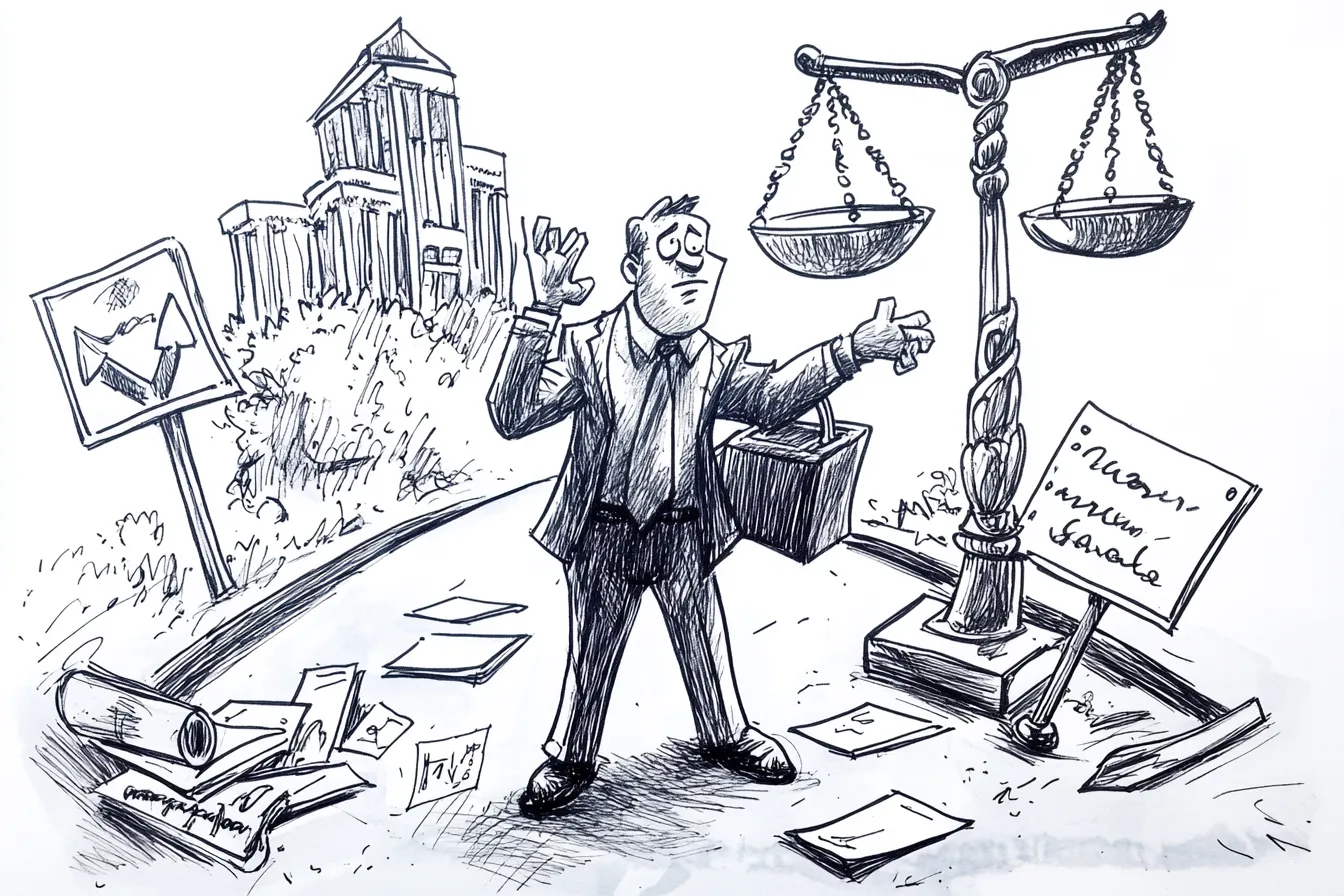The Legal Personhood of Decentralized Systems



How do decentralized systems operated collectively by large numbers of people interact with legal systems? That is a hard question. It is hard with respect to a single legal system. And the complexity explodes once you recall there are hundreds of different legal systems around the world. The world has structures that allow you to set up shop within a given legal system and then extend branches into others. And governments around the world have procedures to scoop up operators that do not comply with the rules.
But how is this supposed to work if an organization exists entirely on-chain? Mechanically – again, this is just a mechanical analogy – such structures look a lot like traditional equity. Certainly most decentralized autonomous organization (DAO) voting procedures look mechanically similar to something like all the shareholders voting at hastily convened board meetings. This is not to argue these things are equities, or some other kind of securities. The point is simply that the procedures at least rhyme with traditional arrangements and so a wholesale rewrite of the rules is probably not necessary.
And there are a few proposals out there that try to fit DAO-like arrangements within legal systems. Some rely on simple new laws. Others corral flocks of contracts into formations from which DAO-like entities can emerge. Some earlier schemes, most prominently "the Foundation," looked more like blunt naive instruments meant to paper over the problem for a while without addressing any of the substance. And then recently a16z put out a strange proposal that breaks with some of their past positions and advocates for solutions that do not appear workable for many common cases.
So let's look at what the problems of attaching a DAO to a legal system are, what these proposals claim to do, and then see if we can learn anything by looking at who is supporting what. As we are going to see some of these proposals look like straightforward attempts to get out of future trouble by claiming something was not clear and a good faith effort was already made so there's no reason for penalties. Others suggest maybe it's only unrealistically simple DAO arrangements that require, or fit in, these novel schemes. The big, complex and already-in-widespread-use-with-whatever-structure-they've-got-today DAOs? There are likely issues incoming for many of them.
The Problem
General partnerships are an old, well-established, legal structure that essentially binds a group together and imposes unlimited "joint and several" liability on the group. Unlimited means partners can be sued for more, and loose more, than their initial investments. And "joint and several" means that actions can be taken against any individual member as though they were the entire partnership and, if that member looses, the individual member has to go try to collect from their partners. If three people are in a general partnership and one absconds with all the investor funds then investors are free to pursue either, or both, of the remaining partners. If those partners loose it is up to them to go find the missing partner and take further action.
This is, for most of the world, the default business arrangement if you do zero paperwork. And there are good reasons for that. Having this sort of broad liability the default encourages people to organize properly and discourages reliance on an "Oh, sorry, we forgot to do the paperwork" defense. It is just too easy to take advantage of a weaker default liability arrangement.
So a DAO that exists for some purpose – running a protocol, managing risk, whatever – is likely to be a general partnership unless paperwork is sorted out. And this is not a problem specific to web3 at all. Partnership law, and the many forms of limited liability structures that exist today, are all well developed precisely because this basic problem has existed for centuries. In particular, governments have a general interest in ensuring there are no obvious loopholes in tax law. As a result the "no paperwork done" solution can easily result in catastrophic tax problems. By design. So people do the work to set up proper tax compliance and pay whatever the taxes are for their circumstances.
Now before we go into any further notice something about the default "We did no paperwork" DAO setup. Anyone that wants to take advantage of broad liability is going to sue the richest partnership members. Small anonymous tokenholders are far less likely to get sued than large, well-funded, doxxed investment firms. Joint and several may get you a judgement but you still need to collect. You're likely to sue the richest partners you can find so you can collect.
Solutions
a16z supports the Wyoming DUNA as a solution. The idea here is to set up a simple "nonprofit" entity that natively supports the idea of blockchain-mediated governance and provides a vehicle for both compliance and limited liability. Before even getting into the detail of the solution notice that the law is absolutely not technology neutral. It does not embody some general principles that are independent of software. It, instead, shockingly micromanages the technology. The law applies specifically to " decentralized ledger technology " and " digital assets " in ways that explicitly reference blockchains.
Go read those definitions and notice they include traditional bank balances so long as those balances are stored in replicated databases. So either these definitions include nearly all the electronic money in the world – banks use replicated databases and most cash does not exist in physical form – or it is technology-dependent. Interesting to now argue for explicit blockchain technology special treatment. Already we can smell a hint of bad faith.
DUNAs are nonprofits. But they are able to engage in profit-making activities and pay "reasonable compensation" to members for work done in furtherance of the organization's goals. It can also buy back membership interests and "confer benefits." It cannot pay dividends but a large portion of the stock market pays no dividends and redistributes cash via buybacks and other benefits. To a competent financial engineer the DUNA law is not much of a barrier on payouts. So this solution looks like a strange veneer of nonproift status on top of special, lenient, treatment for a specific technology under one state's law.
There are other interesting porposals out there. A prominent and quite-outspoken web3 lawyer proposes the BORG as a sort of framework to attach autonomous technologies to legal entities. This scheme does not require new laws. Instead it proposes chartering business entities in ways that place ultimate control with automated software. For example it is one thing to commit that a given legal entity will effect all decisions made by some on-chain voting scheme. But it is something far heavier to empower that on-chain voting scheme to cut off payments to the legal entity for services if it misbehaves. The idea with BORGs is to somehow get a legal entity subservient to automated processes by assembling the right paperwork and code. This is technology neutral. So long as your achieves that outcome it does not matter if your scheme involves a blockchain.
To work this through imagine there is a "BORG multisig" with holds all the assets and the BORG has some ability to effect payments from that wallet. It looks like the BORG's managers are in charge here whatever the documentation says. Now impose a 48-hour hold on all outgoing transfers and empower the DAO to block all outgoing transfers within that window. This, effectively, pushes the BORG under the DAO. With some game theory, some good incentive design and a few blunt control instruments we can weave together a solution. That's the idea.
The third idea we will explore here is the Q blockchain . This is an attempt to embed DAO governance directly into a blockchain's consensus mechanism thereby gaining access to native slashing and all the governance- and forking-related activity that will occur anyway. If Bitcoin is not a legal entity, this idea goes, then by tying yourself as closely as possible to a decentralized blockchain with sufficient programmability you can rely only on private contracts. This is certainly an intellectually clean idea and involves fewer machinations than a BORG.
Realities
The first problem, as is explicitly referenced in the BORG proposal, is that many
"real world assets" like securities and bank balances cannot be shoved under an automated process. When there is independent custody and that custodian is subject to court procedures independent of whatever scheme was put in place then the independent party is, well, independent. These types of arrangements only work when the assets can be subordinated to an automated decentralized control. This severely limits what assets can be managed in cleanly decentralized ways. Those limitations prevent many existing large DAO-managed projects from reorganizing in this way. If you are, say, a real estate or other physical real world asset project how are you going to get something like a government land registry subservient to your smart contracts? The short term answer at least is that you are not.
As referenced above the original scheme was the Foundation. This podcast includes a long discussion around the idea that you can solve all your problems by stuffing everything into a Cayman Islands Foundation or similar. Everyone in the discussion agrees that this does not, and cannot, wave away all the problems for people physically present in other countries. Nobody has yet considered whether a Cayman Foundation – which can be ownerless and memberless – might work if the entire development team, the entire marketing team and the whole user base all sit in the Cayman Islands. But with a population of under one hundred thousand people that is a legal theory question with essentially no practical applications. Real world assets include, of course, the people who work on these projects. And schemes to shift liability around need to accommodate them too!
So we are going to care a lot about schemes that might plausibly cover real development teams and real marketing teams and real user bases. Solutions like the BORG and Q can, at best, handle only a small slice of use cases. If a human working in the United States refuses to follow a court order because the structure of the system prevents them from effectively doing so that person is running a lot of risk. If something bad happens this risk is substantial. And when the system is designed in such a way that you know you are a figurehead – you're the director of the entity, say, but know you cannot override DAO vetos on-chain – that person likely has a big problem.
This leaves us with schemes akin to the DUNA where this is a real legal entity and all manner of documentation is in place. DUNAs are creatures of Wyoming so it is pretty likely they are safe within Wyoming. But the strange nonprofit-that-can-do-for-profit-business status may well run in to all kinds of trouble. The scheme could be considered a security. It could be some kind of partnership arrangement with tax issues. Or any number of other problems.
Further, DUNAs allow member anonymity. But is this realistic in the limit? If the DUNA's "nonprofit" activity is to distribute earnings to tokenholders based on a mixture of their token holdings and how often they exercise on-chain voting right will a bank or securities broker consider them as beneficial owners for AML/KYC/etc purposes? If the DUNA can exist entirely on-chain then anonymity won't be a problem. But how is such an entity going to open a bank account to run a government-bill-backed stablecoin? If all the rules are followed DUNAs do not look to handle a lot of use cases either. Trying to open an account by saying "I have a tax id number but no idea who my beneficial owners or managers are" will result in laughter but no account.
This is all too reminiscent of the 2020-2022 period when several US banks and fintech providers were willing to bank web3 companies without anything like adequate AML/KYC. Maybe a handful of operators, rebirths of Evolve, Series, Silvergate, Signature and Synapse, will pop up to serve these entities with similarly-poor procedures. But that will likely end the same way. Then remember that payments out of a Wyoming-domiciled DUNA to an anonymous member have all kinds of tax compliance issues. Is the answer really that these mechanisms provide a complete end-run around taxes in the United States. That feels unlikely. More likely is that whoever is identifiable within these structures will face severe problems when they finally blow up.
Might these three sorts of schemes handle fresh layer-1 blockchains that require minimal ongoing maintenance and marketing? Sure. But those are the easy problems. The real issues always relate to more complex products that need bank accounts or need to hold assets or hire developers. The real problems, bluntly, are the existing multi-billion-dollar DAOs out that with ongoing operations and unclear legal status.
A Theory
What's common to these three styles of solution is that they do not look to accommodate a large slice of projects that are out there. Yes, they can handle some things. But those are generally the easy cases. These are complex solutions that do not look to handle cases significantly beyond the simple solutions we already have.
But there is another possible explanation. a16z's General Counsel recently wrote about the end of the foundation era in crypto advocating using DUNAs, BORGs and a range of complex, novel, tools. But back in 2022 the same person, also at a16z, issued some warnings about DAOs and proposed a number of structures essentially none of which was ever used at scale.
The main thrust of that first piece was a concern that commonly used structures made tax compliance difficult-to-impossible and might be treated as general partnerships "irrespective of disclaimers and specific intent to not form a partnership." a16z was, in essence, worried it might be on the hook for tax and other legal problems. And, as a large, well-funded and highly public entity a16z is the kind of target people might sue.
And this is happening . Over and over . DAOs using basic structures are found, repeatedly, to be something like general partnerships where the investors have significant liability. That's the backdrop. To review:
- A major investor wrote publicly about issues with DAO legal structures and warned investors might have liabilities they do not want to expect.
- That investor was, repeatedly, found to be a member of an unincorporated general partnership with liabilities they do not want. (They cannot act surprised even if they disagree with the court because of the above).
- That investor, now, proposes new schemes that would insert liability firewalls but possibly render projects non-functional.
The play is easy to read. We've seen it over and over in web3. The next few steps might well be :
- Claim the rules were always unclear and they tried the best they could.
- Lobby for an ex post get out of jail free card because they've switched structures to something more compliant.
Notice this has the same problems discussed a few weeks ago . There the key issue was that safe harbors for aspirationally decentralized products can be used to shield pump-and-dumps by just giving away the post-dump worthless product. The safe harbours make little to no sense from a public policy perspective because they open gaping holes in decades-only investor protection laws for no clear reason except blessing money people made from a handful of non-compliant products recently.
Here the problem is that investors that benefited from non-compliant products want to retroactively remove their liability by using structures that would never have allowed the benefits to accrue in the first place. The securities safe harbours damage investor protection as a side-effect of benefiting a small number of investors. That's not great. But those investors can make a case with a straight face that maybe the rules were not clear. Maybe.
Here, with DAOs, the idea is to retroactively bless knowing non-compliance. Some people may be able to claim ignorance or confusion. But if you put out a detailed two part series in 2022 acknowledging these problems those claims are unavailable. So much of this now looks like a byzantine show intended to dress up claims akin to " the dog ate my homework " before the tsunami of lawsuits hits the city.
Elsewhere
Blockcast
Licensed to Shill III: Understanding the MAS's Licensing Requirements
In this episode of Blockcast, host Takatoshi Shibayama discusses the recent regulatory changes in Singapore's crypto landscape with guests Hagen Rooke and Lisa J.Y. Tan. They explore the implications of the Monetary Authority of Singapore's (MAS) new licensing requirements for digital token service providers , the impact on centralized and decentralized platforms, and common misconceptions surrounding the regulations.
Blockcast is hosted by Head of APAC at Ledger, Takatoshi Shibayama . Previous episodes of Blockcast can be found here , with guests like Davide Menegaldo (Neon EVM), Jeremy Tan (Singapore parliament candidate), Alex Ryvkin (Rho), Hassan Ahmed (Coinbase), Sota Watanabe (Startale), Nic Young (Oh), Jacob Phillips (Lombard), Chris Yu (SignalPlus), Kathy Zhu (Mezo), Jess Zeng (Mantle), Samar Sen (Talos), Jason Choi (Tangent), Lasanka Perera (Independent Reserve), Mark Rydon (Aethir), Luca Prosperi (M^0), Charles Hoskinson (Cardano), and Yat Siu (Animoca Brands) on our recent shows.

Blockhead is a media partner of Coinfest Asia 2025. Get 20% off tickets using the code M20BLOCKHEAD at https://coinfest.asia/tickets .

Hong Kong's MemeStrategy Makes Historic SOL Investment
Asia's first publicly listed digital asset company acquires 2,440 SOL tokens worth HKD 2.9 million....

Market Rebounds Despite Geopolitical Tensions - Why the Rally Could Extend
Your daily access to the backroom....

Metaplanet Reaches Historic 10,000 Bitcoin Milestone, Surpasses Coinbase in Corporate Holdings
Japanese firm's aggressive Bitcoin strategy delivers 266% yield as stock soars 430% year-to-date fol...

